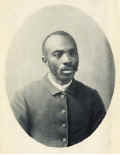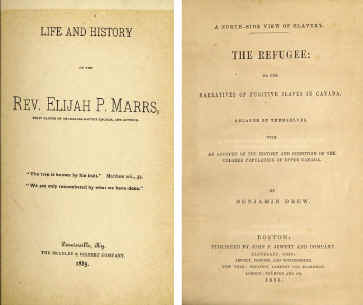Voices From the Past: The Filson's Slave Narrative Collection
By Ebert Haegele
Reference Specialist
About |
The Filson Historical Society collects,
preserves and shares the significant stories
of Kentucky and the Ohio Valley history
and culture. In keeping with its mission,
The Filson’s slave narratives, part of the
Library’s Rare Book Collection, tell the
story of slavery in Kentucky as told by
those who suffered from its injustices the
most. These works offer researchers a rare
insight into Kentucky’s dark past, and also
enlighten the present generation to the daily
struggles African Americans faced while
slaves and during Reconstruction. They
share the stories of the good and the bad,
the horrors of slavery and the indomitable spirit to overcome injustice in the world.
They also serve as a constant reminder to
people of all races where we have been and
how far we have yet to go.
Ohio Valley history
and culture. In keeping with its mission,
The Filson’s slave narratives, part of the
Library’s Rare Book Collection, tell the
story of slavery in Kentucky as told by
those who suffered from its injustices the
most. These works offer researchers a rare
insight into Kentucky’s dark past, and also
enlighten the present generation to the daily
struggles African Americans faced while
slaves and during Reconstruction. They
share the stories of the good and the bad,
the horrors of slavery and the indomitable spirit to overcome injustice in the world.
They also serve as a constant reminder to
people of all races where we have been and
how far we have yet to go.
The Bluegrass State was the gateway to
freedom for many slaves, but it also served
as a grim reminder of evil in the world for
those who were enslaved within its borders.
Those who dared to escape, such as Lewis
and Milton Clarke, were often forced to
take fake names and live in constant fear of
slave catchers. The catchers had authority
to travel into the North and across state
borders to capture fleeing slaves. In Narratives
of the Sufferings of Lewis and Milton Clarke among the Slaveholders of Kentucky (1846),
the Clarke brothers shared their story in an
attempt to spread abolitionist thought and
enlighten the Northern states to the horrors
of slavery. Lewis Clark escaped from slavery
in Kentucky and fled to Canada. He soon  returned to Kentucky to lead other family
members to freedom. Lewis and his brother
Milton then toured the Northeast, lecturing
on their experiences. They devoted their
lives to the abolitionist cause even though it
disheartened them to find, “most ministers
say they are abolitionists, but truth compels
me to add that, in talking with them, I find
many are more zealous to apologize for the slave holders then they are to take any active
measures to do away slavery.”
returned to Kentucky to lead other family
members to freedom. Lewis and his brother
Milton then toured the Northeast, lecturing
on their experiences. They devoted their
lives to the abolitionist cause even though it
disheartened them to find, “most ministers
say they are abolitionists, but truth compels
me to add that, in talking with them, I find
many are more zealous to apologize for the slave holders then they are to take any active
measures to do away slavery.”
Although many of the slave autobiographies are tragic, they often provide an underlying sense of inspiration. In the Life and History of the Rev. Elijah P. Marrs (1885), Marrs, the first pastor of The Beargrass Baptist Church, tells how he transformed himself from a slave to a “God fearing” soldier in the Union Army, fighting for his people’s freedom. Marrs lived the first 20 years of his life as a slave, served 19 months in the military and then devoted his free life to education and spreading the Gospel. Upon reaching freedom, many slaves looked for ways to improve their lives and the lives of their people. These slaves, such as the Rev. J. W. Loguen, used their new lives to preach the Gospel, not just in church but also by living for their fellow brethren. In his autobiography, The Rev. J. W. Loguen as a Slave and as a Freeman: A Narrative of Real Life (1859), Loguen tells of his life as a slave, and then as a free man and how he spread the Gospel to his African American people.
The Refugee (1856),
is a collection of narratives
from free slaves
who escaped slavery and
settled in upper Canada.
This collection of stories
contains 117 stories connected
thematically. They
all search for the answer
to the question: “How
much longer in the name
of God, shall my people
remain in their state of
degradation under the American republic.” Although many of the
African Americans in this book were scared
to share their story, they did so in hope that
they could inform the world of the atrocity
of slavery.
Canada.
This collection of stories
contains 117 stories connected
thematically. They
all search for the answer
to the question: “How
much longer in the name
of God, shall my people
remain in their state of
degradation under the American republic.” Although many of the
African Americans in this book were scared
to share their story, they did so in hope that
they could inform the world of the atrocity
of slavery.
These works are a sample of the numerous slave narratives in The Filson’s Library. Along with The Filson’s slave schedules from our census collection and the extensive manuscripts in Special Collections, these books offer a broader sense of slavery in both Kentucky and the United States. By placing these priceless treasures from America’s past in the Rare Book Collection, The Filson ensures they will endure for future generations.
![]()
The Filson Historical Society
1310 South Third Street - Louisville, KY 40208
Phone: (502) 635-5083 Fax: (502) 635-5086
Hours
The Ferguson Mansion and Office
Monday - Friday: 9 am. - 5 pm.
Saturday and Sunday closed
Library
Monday - Friday: 9 am. - 5 pm.
Saturday: 9 am. - 12 noon
